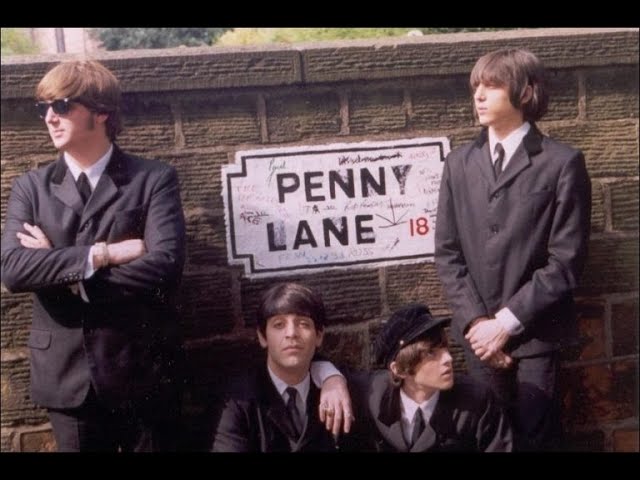
Step into Nostalgia: Enjoy “Penny Lane” by The Beatles (1967) – A Portrait of Everyday Wonder
“Penny Lane” by The Beatles, released in 1967, stands as a shining remembrance of mid-20th century British life, painted with a palette of melody, wit, and sincere observation. At a time when popular music was shifting towards grand statements and psychedelic abstraction, The Beatles—then already cultural titans—offered this warm, intricately detailed vignette as a kind of serene counterbalance. It was a song that revealed its wonder not through bombast, but through familiarity—the ordinary scenes rendered extraordinary by poetic composure and musical charm.
The track—written primarily by Paul McCartney, though credited as always to Lennon–McCartney—is named after a real street in the band members’ hometown of Liverpool. But more than just a geographical reference, “Penny Lane” serves as a lovingly curated snapshot of a world they knew intimately, a time when the corner barber shop and the passing fire engine held quiet fascination. There’s a gentle humor in the lyrics, from the banker who never wears a mac in the pouring rain, to the nurse selling poppies from a tray. Each character and setting is crafted with affection, yet left open to interpretation, allowing listeners to draw their own meaning from these scenes of daily life.
Musically, the song finds The Beatles—and particularly McCartney—at the height of creative confidence. With its brisk piano foundation, chirping piccolo trumpet (inspired by a Bach performance McCartney had seen on television), and the layered harmonies that were quickly becoming a signature of the band’s mid-period evolution, the composition exudes brightness. Yet beneath its upbeat tempo lies a soft sense of longing. It’s not nostalgia in the traditional sense, but something more nuanced—a sort of wistful awareness that such moments, however trivial they might have once seemed, are touched by time’s quiet erosion.
Though the song was released as a double A-side single alongside Lennon’s more surreal “Strawberry Fields Forever,” each track explored a different angle of memory and identity. “Penny Lane” was McCartney’s sunlit memory, contrasting with Lennon’s moodier introspection. Together, they charted new terrain for pop music—not simply to entertain, but to reflect, to remember, and to reframe the personal as cultural. The Beatles were redefining not just songwriting, but the very possibilities of what could be said—and felt—in three-minute compositions.
More than five decades later, “Penny Lane” endures as both a masterwork of songcraft and a gentle invitation to observe the beauty in ordinary life. Whether heard by someone who grew up with its ringing trumpet and vivid imagery, or discovered anew by a younger generation, the song continues to resonate—not just as a classic, but as a reminder of how everyday details can be immortalized through art. It is not overstated to call it one of McCartney’s most evocative achievements and a cornerstone of The Beatles’ enduring influence.
Video
The Beatles – Penny Lane